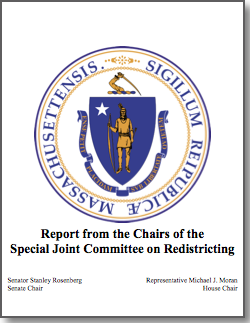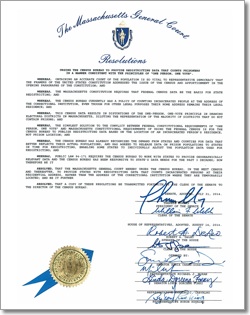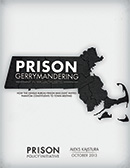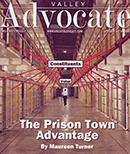Massachusetts
- Sections
- Legislation
- Additional reading
- 2010 Archive:
- Organizations in Massachusetts
- Resolution Supporters
- Testimony
Prison gerrymandering undermines the constitutional principle of "one person, one vote." The Supreme Court requires electoral districts to be based on equal population in order to give each resident the same access to government. But a longstanding flaw in the Census counts incarcerated people as residents of the prison location, even though they can't vote and aren't a part of the surrounding community.
When legislators use unadjusted census data to draw district lines, people who live close to the prison get more of a say in government than everybody else.
The state legislature and some municipalities have previously used Census Bureau counts that tabulated incarcerated people as residents of the prison location, inflating the local population counts used for legislative districts. Padding legislative districts with prison populations artificially enhances the voices of people in those districts at the expense of all districts that do not contain a prison. The issue is further complicated in Massachusetts by the state constitution, which requires the state to use the census as a basis for determining state legislative districts.
Massachusetts has made some progress:
Legislation:
Massachusetts should consider revising the state constitution to allow the legislature to adjust Census data for redistricting purposes in the future, ensuring that prison populations do not add additional unwarranted political clout to the districts that contain them.
During the 2010 redistricting cycle, the legislature took two important actions.
First, the state ensured that they would minimize the impact of prison gerrymandering by looking at the prison populations in the Census data to ensure that the state would not accidentally (or purposely) concentrate prison populations within a small number of districts, as documented in  the redistricting committee's final report. Senate Chair Stanley Rosenberg and House Chair Michael J. Moran devote about a quarter of their report to reviewing the dilution caused by the Census Bureau's decision to tabulate incarcerated people as residents of the prison location instead of at their legal home addresses, and provide an overview of the committee's efforts to ameliorate its effects. The state continued to use this approach in the 2020 redistricting cycle, once again mitigating the impact of prison gerrymandering in Massachusetts.
the redistricting committee's final report. Senate Chair Stanley Rosenberg and House Chair Michael J. Moran devote about a quarter of their report to reviewing the dilution caused by the Census Bureau's decision to tabulate incarcerated people as residents of the prison location instead of at their legal home addresses, and provide an overview of the committee's efforts to ameliorate its effects. The state continued to use this approach in the 2020 redistricting cycle, once again mitigating the impact of prison gerrymandering in Massachusetts.
Having mitigated the harms of prison gerrymandering in the state districts, Massachusetts then called on the Census Bureau to fix the problem going forward.  The legislature passed a joint resolution "Urging the Census Bureau to Provide Redistricting Data that Counts Prisoners in a Manner Consistent with the Principles of 'One Person, One Vote,'". The resolution was sponsored by Senators Sonia Chang-Diaz and Linda Dorcena Forry. The resolution calls on the Census Bureau to change the way the Bureau tabulates prison populations. By tabulating incarcerated people at their residential addresses, as called for in the resolution, the Bureau would create a national and permanent solution to prison gerrymandering.
The legislature passed a joint resolution "Urging the Census Bureau to Provide Redistricting Data that Counts Prisoners in a Manner Consistent with the Principles of 'One Person, One Vote,'". The resolution was sponsored by Senators Sonia Chang-Diaz and Linda Dorcena Forry. The resolution calls on the Census Bureau to change the way the Bureau tabulates prison populations. By tabulating incarcerated people at their residential addresses, as called for in the resolution, the Bureau would create a national and permanent solution to prison gerrymandering.
In addition to the state's efforts of controlling ending prison gerrymandering in state legislative districts, individual towns are also taking steps to protect their local democracy. Tabulating incarcerated populations as if they resided where the correctional facility is located also causes other problems for towns in Massachusetts, which have achieved individual legislative solutions. The towns of Harvard, Lancaster, Middletown, and Shirley have asked the Governor to introduce special legislation (H03439, H03440, H03468, and 2001 Mass. Acts ch. 133, respectively) so that they would do not need to draw additional precincts for the non-voting prison population.
Additional reading
 Report: Prison Gerrymandering in Massachusetts: How the Census Bureau prison miscount invites phantom constituents to town meeting by Aleks Kajstura, October 30, 2013 (PDF)
Report: Prison Gerrymandering in Massachusetts: How the Census Bureau prison miscount invites phantom constituents to town meeting by Aleks Kajstura, October 30, 2013 (PDF)- Video: Prison gerrymandering in Massachusetts: The Census Bureau's prison miscount & town meeting
- Redistricting Redux: A new report argues for what should change next time and what should stay the same, by Maureen Turner, Valley Advocate, January 8, 2013
- Report from the Chairs of the Special Joint Committee on Redistricting by Committee Chairs Senator Stanley Rosenberg and Representative Michael J. Moran, December 12, 2012
- Legislation: including model legislation, current bills, and archive of past legislative efforts
- Pathfinder: a guide to resources on prison gerrymandering
- Prisoners Count: Lawmakers look at fixing Massachusetts' "representation without population" problem, by Maureen Turner, Valley Advocate, July 26, 2012
- Redistricting maps almost complete, by Christine Lee, WWLP, June 21, 2012
- Report: Importing Constituents: Prisoners and Political Clout in Massachusetts by Elena Lavarreda, Peter Wagner and Rose Heyer, October 6, 2009. An analysis of districts drawn after the 2000 Census
 The Prison Town Advantage Inmates who can't vote nevertheless add to the power of the politicians who don't represent them, by Maureen Turner, Valley Advocate (Western Mass.), October 8, 2009
The Prison Town Advantage Inmates who can't vote nevertheless add to the power of the politicians who don't represent them, by Maureen Turner, Valley Advocate (Western Mass.), October 8, 2009
2010 redistricting cycle, campaign archive:
Organizations in Massachusetts
Massachusetts's progress toward fair districting made in the 2010 redistricting cycle was lead by the following organizations:
- Delia Vega at Ex-Prisoners and Prisoners Organizing for Community Advancement (EPOCA)
- Rev. George Walters-Sleyon at The Center for Church and Prison
- Chuck Wynder at Boston Workers Alliance
- Brenda Wright at Dēmos
- Peter Wagner at the Prison Policy Initiative
Local Organizations supporting Resolution S 309/H 3185
On March 27, 2013, more than 20 Massachusetts-based organizations submitted a joint letter urging the Massachusetts Legislature's Joint Committee on Election Law to pass S 309/H 3185, a resolution calling on the Census Bureau to count incarcerated people at their home addresses.
- ACLU of Massachusetts
- Arise for Social Justice
- Boston Workers’ Alliance
- The Center for Church and Prison
- Charles Hamilton Houston Institute for Race and Justice at Harvard Law School
- Coalition for Effective Public Safety in Massachusetts
- Common Cause Massachusetts
- CURE- Massachusetts at Global Ministries Christian Church
- Dēmos
- Ex-Prisoners and Prisoners Organizing for Community Advancement (EPOCA)
- Families For Justice As Healing
- Lawyers' Committee for Civil Rights and Economic Justice
- Lifers' Group, Inc.
- MassVOTE
- NAACP, New England Area Conference
- Nonprofit VOTE
- Norfolk Lifers’ Group
- Oiste
- Out Now
- Prison Birth Project
- Prison Policy Initiative
- Prisoners’ Legal Services of Massachusetts
- The Real Cost of Prisons Project
- Students for Social Justice and Institutional Change, Smith College
Would your organization like to be added to this list of supporters? Let us know!
Testimony
- Aleks Kajstura and Brenda Wright, before the Joint Committee on Election Law March 27, 2013
- Gavi Wolfe of the American Civil Liberties Union of Massachusetts, before the Joint Committee on Election Law, March 27, 2013
- Memo of support of the resolution calling on the Census Bureau to end prison gerrymandering by Leah Aden, NAACP LDF, March 27, 2013
- Peter Wagner and Brenda Wright, before the Special Joint Committee on Redistricting, June 28, 2012
- Peter Wagner and Brenda Wright, before the Special Joint Committee on Redistricting of the Massachusetts General Court, October 25, 2011
- Brenda Wright, before the Special Joint Committee on Redistricting of the Massachusetts General Court May 14, 2011
- Peter Wagner, before the Special Joint Committee on Redistricting of the Massachusetts General Court May 31, 2011
Events
- August 5, 2024:
On Wednesday, August 5, 2024, at 3 PM EST, we’ll host a panel of advocates to discuss the importance and challenges of helping people in prison testify at legislative hearings, and introduce our new legislative testimony toolkit.
Panelists include: Anthony Blakenship of Civil Survival, Jesse White of Prisoners’ Legal Services of Massachusetts, and incarcerated journalist Christopher Blackwell.
Register here.
Not near you?
Invite us to your city, college or organization.





